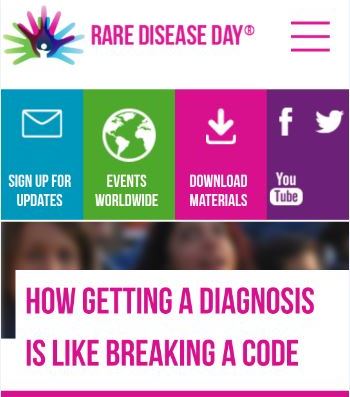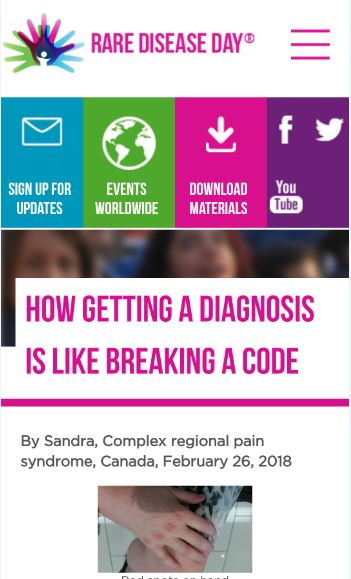Founded in 2008, international Rare Disease Day(1) is celebrating its 10th anniversary this year, on February 28th. What is Rare Disease Day? I’m so glad you asked!
It’s a day on which healthcare professionals and volunteers, medical students, trainees, patients and caregivers, researchers, and the general public are all encouraged to learn about rare diseases – and to share their related experience and knowledge with others.
So it’s a day for… pretty much everyone! The rare disease patient and caregiver community especially is encouraged to get involved in raising awareness – to the extent that they’re able – by sharing their patient journey and stories.
This is because the views – even within the healthcare professions – are starting to shift towards seeing patients as partners in healthcare and also as experts in disease experience.(2)
How can caregivers and patients share their stories, to raise awareness of their rare diseases? Share the challenges involved in rare diseases, at a more general level? We can use any means we can think of!
Some of the outreach activities that caregivers and patients (like me!) have used so far are:
- art
- blogs (like this one!) and vlogs
- community and media outreach
- conversations, just reaching out one-on-one (I do this whenever someone seems interested in my hand/wrist brace)
- dance (watch Lazylegz (Luca) Patuelli, who’s made a career of dancing with a rare disease! https://www.lucapatuelli.com
- music and song
- photography
- poetry and creative writing
- presentations at live events and webcasts
- radio shows
- social media (I post rare disease information on 4 different platforms!)
- videos
- articles for the official Rare Disease Day website, like this one I wrote:
Healthcare professionals are also encouraged to present information – on the rare disease(s) they treat – to others working within healthcare, as well as to patients and the public. Events are planned for Rare Disease Day at hospitals and universities, even at some small clinics.
If you’re one of my colleagues, someone working in bioethics in any country, I strongly encourage you to participate in Rare Disease Day as a healthcare professional.
The issues and challenges facing the rare disease community fall under (m)any of the 4 commonly accepted principles of bioethics (3):
- Respect for autonomy
Hear directly from patients about their rare disease experiences; for the 50% of these diseases that affect children (1), their caregivers & parents share their journeys - Nonmaleficence
Rare diseases are often misdiagnosed, sometimes for years, and increasing awareness of them can help prevent this - Beneficence
Any increase in knowledge – of the 6,000 currently documented rare diseases (1) – has the potential to help improve care for future patients - Justice
Lack of awareness of rare diseases, within healthcare, has created injustices in terms of access to diagnosis and disease-appropriate care
If you’d like to attend an event for Rare Disease Day, you ca visit this website to find out what’s been planned in your area – you can filter or sort the events by country and/or by disease:
https://www.rarediseaseday.org/events/world.
You’d rather take part from your home or office? No problem!
Click here for short Rare Disease Day stories and videos from patient and caregivers. These 500-word stories – or videos – show the diversity of rare diseases, and of patients and caregivers.
So many people with rare diseases are children, and their parents’ stories are incredible!:
https://www.rarediseaseday.org/tell-your-story
Each story on the Rare Disease Day website is written in simple language. That’s because the website has a truly global reach, so readers around the world may be using translation – and these often work best with simpler terms.
To read my story on the Rare Disease Day website, click here for a direct link: https://www.rarediseaseday.org/stories/6146. There are only 2 other stories about Complex Regional Pain Syndrome (CRPS), my rare disease; although it’s sometimes also called Reflex Sympathetic Dystrophy (RSD), which was its old name.
Thanks for reading, and for sharing in my patient journey 😉
References
(1) Rare Disease Day is coordinated by the European Organisation for Rare Diseases (Eurordis). For more information, visit the Rare Disease Day 2018 website at: https://www.rarediseaseday.org/article/about-rare-disease-day.
(2) Pomey, Marie-Pascale et al. “Patients as Partners: A Qualitative Study of Patients’ Engagement in Their Health Care.” Ed. Antony Bayer. PLoS ONE 10.4 (2015): e0122499. PMC. Web. 4 Mar. 2018. Web: http://journals.plos.org/plosone/article?id=10.1371/journal.pone.0122499
(3) Beauchamp, Tom and Childress, James. Principles of Biomedical Ethics, 7th Edition. Oxford University Press. 23 Oct 2012. https://global.oup.com/academic/product/principles-of-biomedical-ethics-9780199924585?cc=ca&lang=en&


